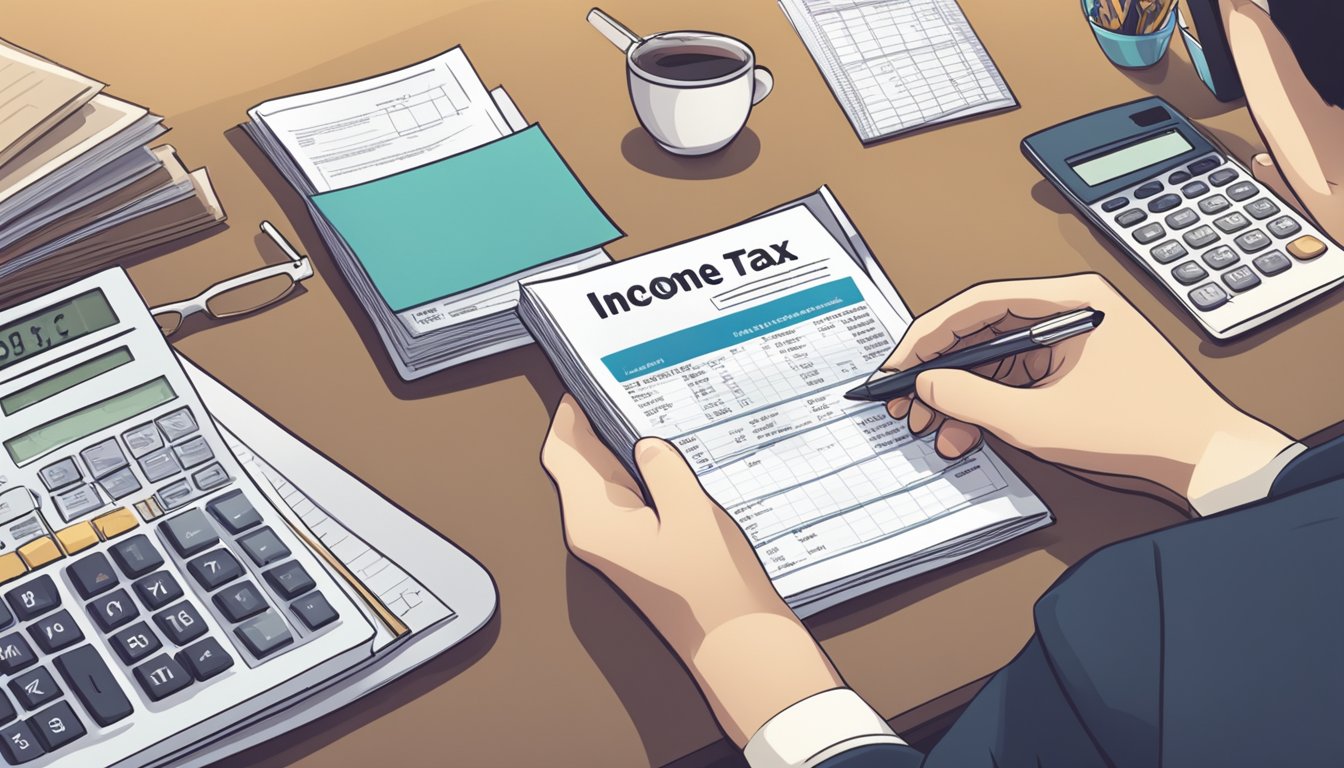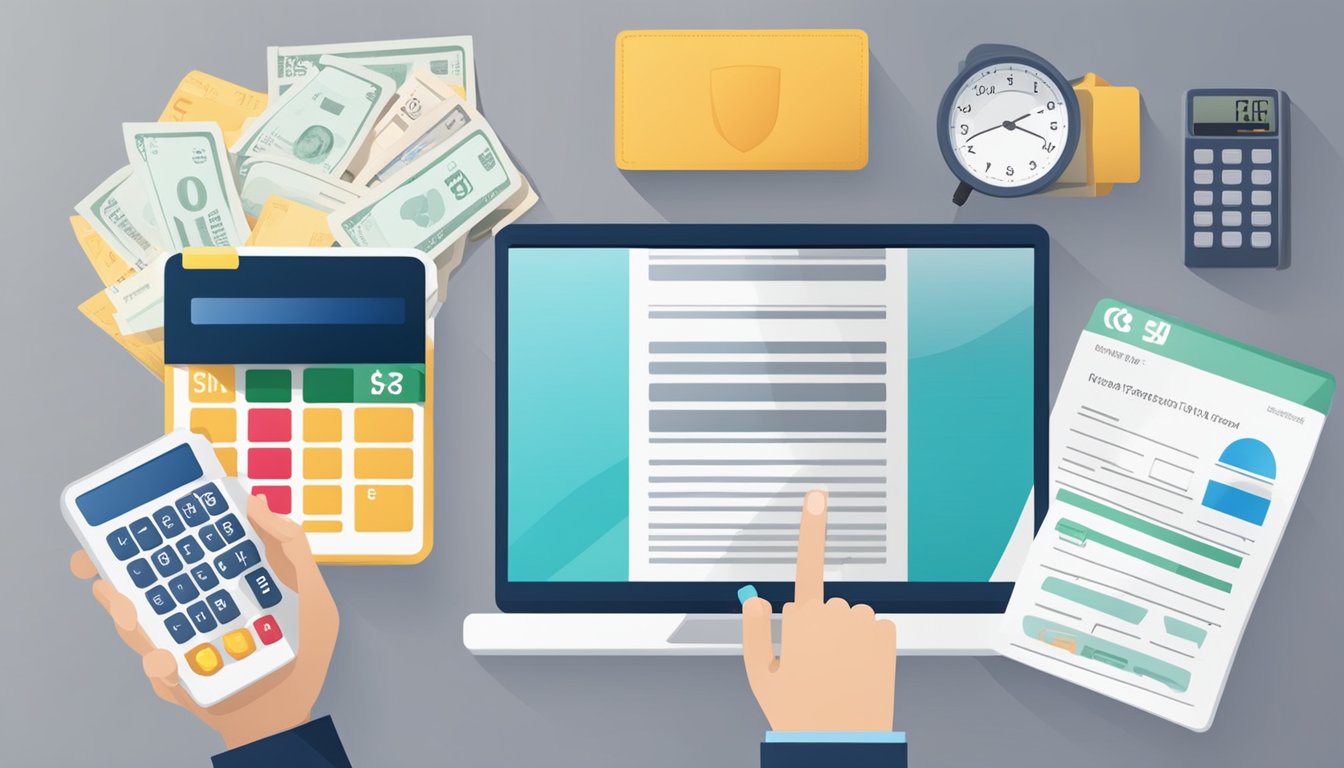Are you looking for ways to manage your personal finances in Singapore? A critical aspect of personal finance is understanding the country’s income tax system.
Singapore has a progressive personal income tax system, which means that the more you earn, the higher the percentage of tax you pay.

As of 2024, Singapore’s top marginal personal income tax rate will be increased to 24% for those earning more than $1 million per year. This change aims to achieve greater progressivity in the tax system.
Understanding how the tax system works is essential in ensuring you are paying the correct amount and not overpaying.
1-Minute Read: Tax Efficiency Singapore Edition!
Time-pressed Singaporean? This section’s got you covered! Understanding Personal Income Tax is vital to maximizing your financial well-being. Here’s a quick rundown:
- Progressive Rates: Singapore uses a progressive tax system, meaning you pay more tax as your income increases. Rates range from 0% to a maximum of 22%.
- Tax-Free Threshold: Breathe easy if you’re starting! You don’t pay tax on your first S$20,000 of annual income.
- CPF & SRS Savings Power: Boost your retirement savings and get tax benefits! Contributions to your Central Provident Fund (CPF) and Supplementary Retirement Scheme (SRS) are fully deductible from your taxable income.
- Earned Income Relief: The government acknowledges the value of your hard work! Depending on your age, you may qualify for additional tax relief on your earned income.
That’s the whistle-stop tour! But wait, there’s more! Uncover tax-saving strategies and deductions to make your hard-earned dollars go further.
Stay tuned for a deeper dive into maximizing your personal finance through Singapore’s Personal Income Tax system!
Understanding Personal Income Tax in Singapore

If you are a Singapore resident, you must pay personal income tax on your income earned in Singapore and abroad. In this section, we will explain what personal income tax is and the role of IRAS in Singapore’s tax system.
What is Personal Income Tax?
Personal income tax is a tax on your income. In Singapore, personal income tax is charged on the income earned by individuals, sole proprietorships, partnerships, and other unincorporated entities. The tax is based on the income you earn in a year and is calculated using a progressive tax system. This means that the more you earn, the higher the tax rate you pay.
The tax year in Singapore is from 1 January to 31 December. You are required to file your tax return by 15 April of the following year. For example, in 2023, you must file your tax return by 15 April 2024.
The Role of IRAS
The Inland Revenue Authority of Singapore (IRAS) is Singapore’s central tax authority. It is responsible for administering and collecting taxes, including personal income tax. IRAS also provides tax information and assistance to taxpayers.
IRAS uses a self-assessment system for personal income tax. This means you are responsible for calculating your tax liability and filing your tax return. IRAS will then review your tax return and issue a tax assessment. You can file an objection with IRAS if you disagree with the evaluation.
IRAS also provides various tax reliefs and rebates to help taxpayers reduce their tax liability. For example, in Budget 2024, all tax residents will be granted a Personal Tax rebate for the Year of Assessment 2024. The rebate will be 50% of tax payable, capped at $200 [1].
Determining Tax Residency

If you are living or working in Singapore, it’s crucial to determine your tax residency status. This status determines the amount of tax you owe and which income sources are taxable. Here are some factors to consider when deciding your tax residency status.
Tax Resident vs Non-Resident
In Singapore, tax residents are individuals who have stayed or worked in Singapore for at least 183 days in a year or have established a permanent home in Singapore. Non-residents are individuals who do not meet these criteria.
As a tax resident, you are subject to income tax at progressive rates ranging from 0% to 22%. On the other hand, non-residents are subject to a flat rate of 15% or the progressive resident tax rate, whichever results in a higher tax amount.
Tax Residency Status and Its Impact
Your tax residency status in Singapore significantly impacts your tax liability. As a tax resident, you are eligible for various tax reliefs, such as personal, spouse, and parent reliefs. You are also eligible for double tax relief if you are taxed on the same income in another country.
On the other hand, non-residents are not eligible for most tax reliefs, and their employment income is taxed at a higher rate. Non-residents are also not eligible for tax exemptions on certain types of income, such as dividends and interest.
Determining your tax residency status is crucial for your personal finance planning. If you are unsure about your tax residency status, refer to the IRAS website for more information.
Income Tax Rates for Individuals

When it comes to personal finance, understanding income tax rates is crucial. In Singapore, personal income tax rates for resident taxpayers are progressive. This means that the higher your income, the higher your tax rate.
Progressive Resident Tax Rates
The current highest personal income tax rate in Singapore is 24%. However, this rate only applies to the portion of your income that exceeds S$320,000 per year. For income below this threshold, lower tax rates apply. For example, the tax rate for income between S$80,001 and S$120,000 is 7%.
To determine your tax rate, refer to the individual income tax rates table in the Inland Revenue Authority of Singapore (IRAS).
Flat Rate for Non-Residents
Non-resident individuals are taxed at a flat rate of 22% (24% from the year of assessment 2024) on their income earned in Singapore, except for employment income. Employment income earned by non-residents is taxed at a flat rate of 15% or at resident rates with personal reliefs, whichever yields a higher tax, according to PwC’s Tax Summaries.
It is important to note that personal income tax rates in Singapore are not flat. Instead, they are determined based on your income level and tax residency status. If you are a resident taxpayer, your income tax rate will be determined using progressive resident tax rates. If you are a non-resident, your income tax rate will be determined using the flat rate for non-residents.
Understanding your income tax rate is critical to effectively managing your finances. Knowing the tax rates and thresholds allows you to plan your budget and investments accordingly.
Types of Taxable Income

When it comes to personal income tax in Singapore, you need to be aware of several types of taxable income. These include employment income, business, trade, professional income, and property and investment income.
Employment Income
Employment income refers to any income you receive, including salaries, bonuses, commissions, and allowances. This type of income is subject to personal income tax in Singapore and is considered taxable.
Business, Trade, and Profession
If you are self-employed or own a business, you must pay taxes on your business income. This includes income from trade, profession, vocation, or business. You will need to keep accurate records of your income and expenses to ensure that you are paying the correct amount of tax.
Property and Investments
Income from property and investments is also subject to personal income tax in Singapore. This includes rental income, dividends, and interest income. If you own property that generates rental income, you must declare this on your tax return. Similarly, if you have investments that generate income, you must also declare this income.
It is important to note that not all types of income are taxable in Singapore. For example, income from capital gains is not subject to personal income tax. However, if you are unsure whether your income is taxable, it is always best to consult a tax professional or refer to the IRAS website for more information.
In summary, understanding the different types of taxable income is crucial in Singapore’s personal income tax. By keeping accurate records and consulting with a tax professional if necessary, you can ensure that you are paying the correct amount of tax on your income.
Tip: Become an SRS Superstar
Consider voluntarily contributing to your Supplementary Retirement Scheme (SRS) to enjoy additional tax deductions. This is a win-win scenario! Not only will you get tax savings now, but you’ll also be diligently building a nest egg for your golden years.
Tax Reliefs and Deductions

As a taxpayer in Singapore, you may be eligible for certain tax reliefs and deductions that can help reduce your taxable income and lower your personal income tax bill. Here’s what you need to know about tax reliefs and deductions in Singapore.
Understanding Tax Reliefs
Tax reliefs are deductions that can be claimed against your taxable income. They are designed to help taxpayers reduce tax liability and ensure the tax system remains fair and progressive. There are various types of tax reliefs available in Singapore, including personal reliefs, CPF relief, earned income relief, parent and grandparent caregiver relief, course fee relief, and contributions to SRS.
Personal reliefs are available to all Singapore taxpayers, including reliefs for things like your spouse, children, and parents. CPF relief is available to taxpayers who contribute to their CPF accounts, while earned income relief is available to taxpayers who earn a taxable income.
Parent and grandparent caregiver relief is available to taxpayers who care for their parents or grandparents. In contrast, course fees relief is available to taxpayers who pay for their own or their children’s education. Finally, contributions to SRS can also be claimed as tax reliefs.
Eligible Deductions
In addition to tax reliefs, there are also various tax deductions that you may be eligible for in Singapore. Tax deductions are expenses that can be deducted from your taxable income, reducing your tax liability. Some of the most common tax deductions in Singapore include deductions for employment expenses, rental expenses, and business expenses.
You may be eligible for additional tax deductions if you are self-employed or run a business. For example, you may be able to deduct expenses related to advertising, travel, and entertainment. It’s important to keep accurate records of all your payments to claim all the deductions you are entitled to.
It’s worth noting that there is a personal income tax relief cap in Singapore. This means that there is a limit to the amount of tax relief that you can claim each year. The current personal income tax relief cap is $80,000 per Year of Assessment. This is designed to ensure that the tax system remains fair and progressive and that high-income earners do not benefit disproportionately from tax reliefs and deductions.
In conclusion, understanding tax reliefs and deductions is an important part of managing your personal finances in Singapore. By taking advantage of the various tax reliefs and deductions available, you can reduce your taxable income and lower your personal income tax bill.
So ensure you keep accurate records of all your expenses and claim all the tax reliefs and deductions you are entitled to.
Filing Your Income Tax Return

Excited to file your income tax return? In this section, we’ll guide you through the process of filing your income tax return in Singapore.
E-Filing with myTax Portal
The easiest and most convenient way to file your income tax return is through the Inland Revenue Authority of Singapore (IRAS) myTax Portal. You can access the portal using your Singpass or SFA. Once you log in, select “Individuals” and click “File Income Tax Return”. You can then retrieve the draft copy of your Income Tax Return and make any necessary amendments before submitting it.
Tax Return Deadlines and Penalties
It’s important to file your income tax return before the deadline to avoid penalties. The tax filing deadline for individuals is typically on April 15th of the following year, but it can vary depending on your circumstances. For example, if you are self-employed, the deadline is usually extended to May 15th. Make sure to check the IRAS website for the latest tax filing deadlines.
You may face penalties if you fail to file your income tax return by the deadline. The penalty for late filing can range from $100 to $1,000, depending on how late your submission is. Additionally, if you fail to file your income tax return for two or more consecutive years, you may face a higher penalty of up to $5,000 or imprisonment.
To avoid any penalties, file your income tax return on time. If you need help or have any questions, contact the IRAS or visit their website for more information.
That’s it! Now you can file your income tax return in Singapore using myTax Portal. Remember, filing your income tax return on time is essential to avoid any penalties.
Payment Methods and Tax Obligations

If you are a taxpayer in Singapore, you must understand your tax obligations and the available payment options. This section will help you understand the tax payable and payment options.
Understanding Tax Payable
You must pay your personal income tax on time to avoid incurring additional costs. The tax payable is calculated based on your income for the year. You can check your tax bill by logging in to the IRAS website.
The tax payable is based on the progressive tax rate, which means that the more you earn, the higher your tax rate. The tax rate ranges from 0% to 22%. If you are a first-time taxpayer, refer to the IRAS basic guide for more information.
Available Payment Options
To make your tax payment, you can choose from several payment options. The most convenient and secure payment methods are GIRO and PayNow. These digital payment methods ensure safe and seamless transactions. You can learn more about the available digital payment methods by selecting the relevant tax type on the IRAS website.
If you prefer to pay your tax bill manually, you can do so via cheque or cash at any SingPost branch. However, do note that additional costs may be incurred for manual payment methods.
To fulfil your tax obligations, you must file your income tax and pay your tax bill on time. You must also keep records of your income and expense claims for five years. For more information on your tax filing obligations, refer to the IRAS website.
Paying your personal income tax in Singapore is a straightforward process with several payment options available to suit your needs.
Tax Planning and Financial Strategies

When it comes to personal finance, tax planning is crucial to ensure that you are not overpaying on your taxes. Using tax reliefs can reduce your taxable income and save money on taxes.
In this section, we will discuss some tax planning and financial strategies that you can use to reduce your personal income tax in Singapore.
Making Use of Tax Reliefs
The Singapore government offers various tax reliefs that you can make use of to reduce your taxable income. Some of the common tax reliefs include the Earned Income Relief, CPF Relief, and Supplementary Retirement Scheme (SRS) Relief. The Earned Income Relief is a relief given to individuals who are earning an income. In contrast, the CPF Relief is given to individuals who are contributing to their Central Provident Fund (CPF) accounts. The SRS Relief is given to individuals who are contributing to their SRS accounts.
To make the most of these tax reliefs, you must carefully plan your finances. For example, you can contribute more to your CPF account to enjoy the CPF Relief or voluntary contributions to your SRS account to enjoy the SRS Relief.
Investment and Donation Strategies
Investments and donations are also great ways to reduce your personal income tax in Singapore. By investing in certain financial products, you can enjoy tax benefits such as tax exemptions on dividends and capital gains. Some financial products that offer tax benefits include the Supplementary Retirement Scheme (SRS), Singapore Savings Bonds, and the Central Provident Fund (CPF) Investment Scheme.
Donations are also a great way to reduce your personal income tax in Singapore. The Singapore government offers tax deductions for qualifying donations to approved institutions and charities. Donating can reduce your taxable income and save money on taxes.
In conclusion, tax planning is an important aspect of personal finance that should not be overlooked. By using tax reliefs and implementing investment and donation strategies, you can reduce your personal income tax in Singapore and save money on taxes. However, it is important to note that tax evasion is illegal and can result in severe penalties. Therefore, it is important to plan your finances carefully and seek professional advice if necessary.
Special Tax Considerations

If you are a foreigner or a Singapore permanent resident, you need to be aware of some special tax considerations when it comes to personal income tax in Singapore. Here are some important points to keep in mind:
Foreigners and Singapore Permanent Residents
Foreigners and Singapore permanent residents are taxed differently when it comes to personal income tax. As a foreigner, you are only taxed on income earned in Singapore. On the other hand, as a Singapore permanent resident, you are taxed on all income earned both in Singapore and overseas.
Tax for Different Types of Income
When it comes to personal income tax, different types of income are taxed differently. Here are some examples of the different types of income and how they are taxed:
- Remuneration: This includes your salary, bonus, and other benefits. It is taxed at progressive rates, which means the more you earn, the higher your tax rate will be.
- Fees: This includes consultation fees and director’s fees. It is taxed at a flat rate of 22%.
- Interest: This includes interest earned on savings accounts, fixed deposits, and other investments. It is taxed at a flat rate of 15%.
- Royalty: This includes income earned from the use of intellectual property, such as patents and trademarks. It is taxed at a flat rate of 10%.
It is important to keep in mind that these are just some examples of the different types of income and how they are taxed. For a full list of the different types of income and their tax rates, you can visit the IRAS website.
Additional Resources

Looking for more information on personal income tax in Singapore? Check out these additional resources to help you manage your finances.
Tax Calculators and Tools
The Singapore government offers a range of tax calculators and tools to help you estimate your tax liability and plan your finances. The IRAS Tax Calculator allows you to estimate your tax liability based on your income, deductions, and reliefs. You can also use the IRAS Tax Calculator for Rental Properties to estimate your tax liability if you own rental properties in Singapore.
If you are a self-employed individual, you can use the Self-Employed Persons (SEP) Calculator to estimate your tax liability based on your income and deductions. The CPF Contribution Calculator can help you calculate your Central Provident Fund (CPF) contributions as well.
Government Support and Consultation
If you need help managing your finances or have questions about personal income tax in Singapore, there are a range of government support and consultation services available to you. You can log in to your SingPass account to access a range of government services, including tax-related services such as e-Filing and viewing your tax notices.
The IRAS Helpline is also available to answer any questions you may have about personal income tax in Singapore. You can call the helpline at +65 1800 356 8300 or submit an online enquiry form for assistance.
In addition, the MoneySENSE website provides a range of financial education resources and tools to help you manage your finances effectively. You can access information on topics such as budgeting, saving, and investing, as well as find workshops and events to attend.
By making use of these resources, you can stay on top of your personal finances and make informed decisions about your tax liability in Singapore.
Staying Compliant

When it comes to personal income tax in Singapore, staying compliant is important to avoid penalties and legal consequences. Here are some tips to help you stay compliant during tax season.
Avoiding Tax Fraud and Evasion
Tax fraud and evasion are serious offences that can result in fines and imprisonment. To avoid these consequences, declare all your income and assets accurately in your tax return. This includes any income earned from overseas sources.
Additionally, avoid claiming false deductions or credits you are not entitled to. This can also be considered tax fraud and may result in penalties. It is essential to keep accurate records of all your income and expenses throughout the year to ensure you are not caught out during tax season.
Understanding Withholding Tax
If you are a non-resident of Singapore, you may be subject to withholding tax on certain types of income earned in Singapore. This includes income earned from employment, director’s fees, and certain royalties.
It is important to understand your withholding tax obligations and ensure that the correct amount of tax is withheld from your income. Failure to do so may result in penalties or legal consequences.
In conclusion, staying compliant with personal income tax in Singapore is vital to avoid penalties and legal consequences. Ensure you accurately declare all your income and assets, avoid claiming false deductions or credits, and understand your withholding tax obligations. By following these tips, you can ensure that you stay compliant during tax season.
Frequently Asked Questions
How can I calculate my income tax in Singapore?
Calculating your income tax in Singapore is relatively simple. You can use the tax calculator provided by the Inland Revenue Authority of Singapore (IRAS) to determine your tax liability. The tax calculator considers your taxable income, tax reliefs and deductions, and other factors that may affect your tax liability, such as your age and residency status.
What are the current income tax rates for residents in Singapore?
The current income tax rates for residents in Singapore are progressive, meaning that the more you earn, the higher the tax rate you pay. For tax residents, the tax rates start at 0% for the first $20,000 of chargeable income and increase to a maximum of 22% for chargeable income above $320,000. There are also various tax reliefs and deductions available that can help to reduce your tax liability.
At what salary threshold do I start paying income tax in Singapore?
If you are a tax resident in Singapore, you are required to pay income tax on your chargeable income. For assessment 2024, you must file a tax return if your total revenue in the preceding year was more than $22,000 or if you had self-employment income with a net profit of more than $6,000.
Are earnings from personal investments subject to tax in Singapore?
Yes, earnings from personal investments are generally subject to tax in Singapore. This includes income from dividends, interest, and capital gains. However, various tax reliefs and exemptions can help reduce your tax liability, such as the tax exemption scheme for new start-up companies.
Do foreign individuals pay a different income tax rate in Singapore?
Foreign individuals who are tax residents in Singapore are subject to the same progressive tax rates as Singaporean residents. However, non-residents are subject to a flat tax rate of 15% on their employment income or progressive resident tax rates, whichever results in a higher tax liability.
Is interest earned on savings accounts considered taxable income for individuals?
Yes, interest earned on savings accounts is considered taxable income for individuals in Singapore. However, a tax exemption exists on the first $50,000 of interest earned on deposits with qualifying banks and qualifying approved entities.
Personal Loan You Need Quickly & Securely in Singapore
Finding the perfect personal loan can feel stressful. But with Quick Credit Pte Ltd, it’s a breeze! We’re a reliable, licensed moneylender offering quick approvals and funding for your needs.
Why Quick Credit?
- Fast Cash: Get approved within 24 hours and access funds quickly.
- Transparent Rates: See all fees upfront – no hidden surprises.
- Trustworthy Lender: Licensed and committed to responsible lending.
- Apply from Anywhere: Convenient online application process in Singapore.
Do you think you qualify?
As a Singapore resident with a steady income, you might be eligible! Apply online today and see how we can help.
